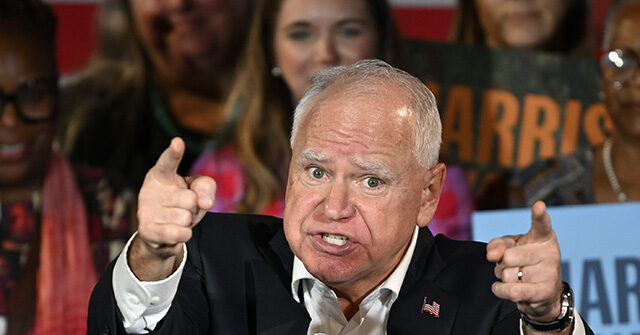In a recent rally in Tucson, Arizona, Minnesota Governor Tim Walz, serving as a vice-presidential candidate, confronted former President Donald Trump, labeling him a “dictator” intent on “overturning the Constitution.” Walz emphasized the critical importance of every vote, explaining that the outcome in Arizona could hinge on just a vote or two per precinct in the upcoming elections. This statement showcased the heightened stakes of the election, underscoring the necessity for democratic participation and the defense of constitutional values. His comments aimed to rally support, appealing to the urgency of the moment while urging potential voters not to take the election lightly.
Walz painted a vivid picture of a future conversation between generations, wherein parents and grandparents might reflect on their roles during a pivotal time in American democracy. He urged his audience to consider how they would respond when asked what actions they took to prevent Trump’s reelection in light of the former president’s perceived authoritarian tendencies. This hypothetical scenario served as a rhetorical device to invoke a sense of duty among voters, prompting them to actively engage in the political process and recognize their responsibility in safeguarding democratic principles. The passion in Walz’s address was directed at instilling a sense of urgency and a proactive mindset among the electorate.
The landscape of the Arizona political scene is critical, particularly as pollster FiveThirtyEight indicates that Trump holds a 2.5-point lead over Vice President Kamala Harris in the state. Arizona is recognized as a crucial battleground in the electoral map, with both parties investing considerable resources to capture its electoral votes. Walz’s remarks in this context underscore the significance of voter turnout in a state that could determine the outcome of the presidential race. His framing of the election as a high-stakes battle reflects broader concerns within the Democratic Party regarding the potential ramifications of a Trump victory.
Trump’s dismissal of claims regarding his dictatorial aspirations complicates the narrative. In a December 2023 interview with Fox News host Sean Hannity, Trump lightly remarked about assuming dictatorial powers on “day one” of his potential next term, indicating his intentions regarding border policy and energy production. His comment punctuates a broader critique of his leadership style, as well as the perception of volatility surrounding his candidacy. While many of Trump’s supporters may view his comments as humorous or indicative of strong leadership, critics perceive them as aligning with autocratic behavior, raising concerns about the health of democratic norms in America.
The contrasting approaches between Walz’s urgent call to action and Trump’s flippancy reflect the polarization within American politics leading up to the election. While Walz implores voters to mobilize against what he describes as an existential threat to democracy, Trump continues to maintain his appeal to a base that largely rallies behind his unconventional style. This dynamic shapes the campaigning strategies and rhetoric emerging as candidates prepare for the intense political battle ahead. The 2024 election cycle is marked not only by traditional campaign issues but also by significant concerns about governance and constitutional adherence.
As the election draws closer, the focus on Arizona highlights the broader trends and tensions within American political discourse. With candidates like Walz emphasizing the importance of civic engagement and the defense of democratic ideals, the narrative becomes intertwined with national security and personal responsibility. The potential consequences of Trump’s reelection serve as a compelling motivator for many voters, suggesting that the upcoming election is not merely a selection of leadership but a referendum on the future of democracy in the United States. The ongoing dialogue surrounding these themes will undoubtedly shape voter attitudes and participation as the nation approaches a critical juncture.

